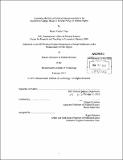Examining the role of political entrepreneurship in the decision to change Mexico's foreign policy on human rights/
Author(s)
Verdini Trejo, Bruno
DownloadFull printable version (2.010Mb)
Other Contributors
Massachusetts Institute of Technology. Department of Political Science.
Advisor
Chappell Lawson.
Terms of use
Metadata
Show full item recordAbstract
Under what circumstances can political entrepreneurs shape policy change? By relying upon the multiple streams framework, this research studies some of the factors that underpin decision-making in the public sector. Through a discussion of the process whereby Mexico became both the first developing country to permanently invite all international observers to monitor domestic human rights violations and the first country not undergoing a civil war to establish an Office of the United Nations Human Rights Commission, the case debates the extent of maneuvering room and the strategies of political entrepreneurs. The study suggests political entrepreneurs can shape policy change without steadfast support from neither elected officials nor a favorable domestic political environment.
Description
Thesis (S.M.)--Massachusetts Institute of Technology, Dept. of Political Science, 2013. Cataloged from PDF version of thesis. Includes bibliographical references (pages 30-39).
Date issued
2013Department
Massachusetts Institute of Technology. Department of Political SciencePublisher
Massachusetts Institute of Technology
Keywords
Political Science.